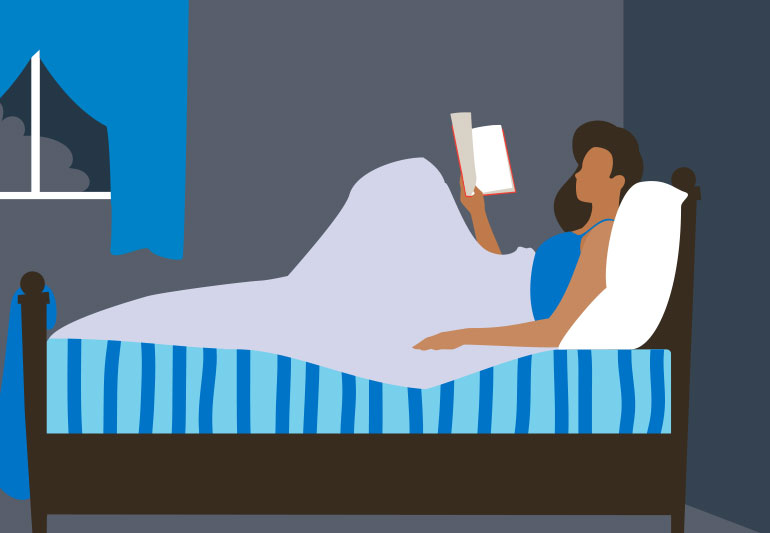Last Updated on July 8, 2025 by Kavya K
In today’s fast-paced digital world, getting quality sleep and maintaining good mental health has become more difficult than ever. Late-night scrolling, binge-watching, overthinking, and work stress have made restful nights a rare luxury. But what if the secret to peaceful sleep and a calmer mind lies in something as simple as a consistent night routine? I used to struggle with insomnia, constant anxiety before bed, and a restless mind that wouldn’t switch off. I tried everything—sleeping pills, motivational videos, and even forced meditation. Nothing worked until I created a personalized night routine—a consistent set of habits I follow every night. Within just a week, I began falling asleep faster, waking up fresher, and feeling more emotionally balanced. In this article, I’ll walk you through the exact steps of my night routine and how it improved my sleep and mental health naturally—without apps or medication.
Step 1: Digital Detox – Disconnect to Reconnect
The first and most crucial step in my night routine is turning off all screens at least 1 hour before bed. This includes my phone, TV, laptop—everything. Blue light from screens interferes with melatonin production, the hormone responsible for making you sleepy. But beyond that, endless scrolling overstimulates the brain, fills it with unnecessary information, and increases anxiety levels. I used to go to bed with my head filled with news, reels, and other people’s lives. No wonder I couldn’t sleep. Now, I set a strict “digital curfew” around 9 PM. I either switch off or keep my phone in another room and use that time to connect with myself—through reflection, journaling, or just sitting in silence. The mental clarity this brings is powerful. Your mind starts winding down naturally, preparing you for deep rest.
Step 2: Clean and Calm – Preparing the Body for Rest
A clean body leads to a calm mind. That’s why I make sure to follow a simple hygiene routine before bed: brushing, washing my face with cold water, taking a warm shower on stressful days, and changing into soft, comfortable clothes. This might sound basic, but it acts as a psychological signal to the body that the day is over. Just like we dress up for work to feel alert, we need to “dress down” for sleep to feel relaxed. I also keep my bedroom clean, dimly lit, and cool. I light a mild-scented incense stick or use lavender essential oil near my bed to create a peaceful atmosphere. This kind of sensory relaxation helps your body shift from ‘doing’ mode to ‘resting’ mode. Your environment should whisper one message to your brain: “It’s time to slow down.”
Step 3: Journaling – Clearing the Mind Before Sleep
One of the biggest enemies of sleep is a noisy, overthinking mind. Thoughts about tomorrow’s to-do list, past regrets, or future fears often haunt us when we lie in bed. To prevent this, I spend 10–15 minutes every night writing in a journal. I divide it into three parts:
- Gratitude – Write down 3 things I’m grateful for that day.
- Thought Dump – Anything that’s bothering me, confusing me, or stuck in my head—I write it all out without editing.
- Tomorrow’s Top 3 Priorities – I write 3 important tasks I plan to complete the next day.
This practice clears my mental clutter, reduces anxiety, and helps me close the day with peace. When thoughts are on paper, they’re no longer floating in your mind. Your brain feels lighter, your emotions feel acknowledged, and you fall asleep with clarity not chaos.
Step 4: Mindful Activities – Reading, Breathing, or Prayer
Instead of mindlessly watching something or scrolling, I now fill the last 30–45 minutes of my day with mindful, low-stimulation activities that promote inner peace. This could be reading a physical book (not a Kindle), practicing deep breathing, or listening to soft instrumental music. On some days, I simply sit in silence and observe my breath. On others, I say a small prayer, expressing thanks for the day. These activities help regulate the nervous system and shift me into a parasympathetic state—also called the “rest and digest” mode. This is the opposite of the stress-filled “fight or flight” mode. Even 5 minutes of deep breathing, like the 4-7-8 technique (inhale for 4, hold for 7, exhale for 8), has improved my sleep quality immensely. These moments before sleep are sacred—they set the emotional tone for your subconscious mind to carry into rest.
Step 5: Consistent Sleep Timing – Training the Internal Clock
Sleep is not just about what time you go to bed—it’s about how consistent you are with it. I used to sleep at random times sometimes 11 PM, sometimes 2 AM and always woke up feeling groggy. Now, I follow a fixed sleep schedule: bedtime by 10:30 PM, wake up at 6:30 AM. Initially, it was hard, but the body adapts like magic. The human body has a biological clock (circadian rhythm), and when you follow a regular sleep pattern, it starts producing melatonin at the right time naturally. Falling asleep becomes effortless, and waking up becomes refreshing. I also avoid heavy meals and caffeine after 7 PM to avoid sleep disturbances. Sticking to a schedule has been one of the most underrated but powerful parts of my night routine.
Step 6: Emotional Check-in – Processing the Day Gently
Before closing my eyes, I take just 2 minutes to ask myself:
- How did I feel today?
- What went well?
- What didn’t go well, and why?
- Is there anything I need to forgive myself for?
This emotional check-in acts like a mini therapy session. It helps me process unresolved feelings, celebrate small wins, and go to bed with compassion. We often carry emotional weight to bed without realizing it. These little moments of reflection help reduce that burden. And when I sleep with a heart that feels heard and held, the rest is truly healing. Over time, this habit has boosted my emotional intelligence, self-awareness, and peace of mind.
Benefits I Experienced After Following This Night Routine
After a month of following this night routine, my life changed in small but powerful ways:
- Faster Sleep – No more tossing and turning for hours.
- Deeper Rest – I wake up without feeling tired, even on busy days.
- Reduced Anxiety – Fewer racing thoughts, more emotional balance.
- Improved Focus – Better mental clarity during the day.
- Better Mood – I feel calmer, more patient, and more grateful.
This isn’t a magic formula—it’s just consistency and intention. The night routine helped me shift from surviving my days to actually living them with awareness.
Conclusion: Start Small, Start Tonight
If you’re struggling with sleep or your mental health feels out of balance, I invite you to try a simple night routine. You don’t need expensive tools or a strict schedule. Just pick 2–3 habits from this article and apply them tonight. Maybe turn off your phone 30 minutes early. Maybe light a candle and read. Maybe write down your thoughts instead of letting them spin in your head. Small steps, repeated daily, can change your nights—and eventually your life. Remember, how you end your day determines how you live the next one. A peaceful night leads to a powerful tomorrow. So start honoring your nights, and your days will thank you.










